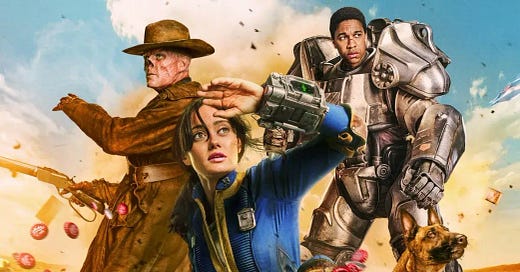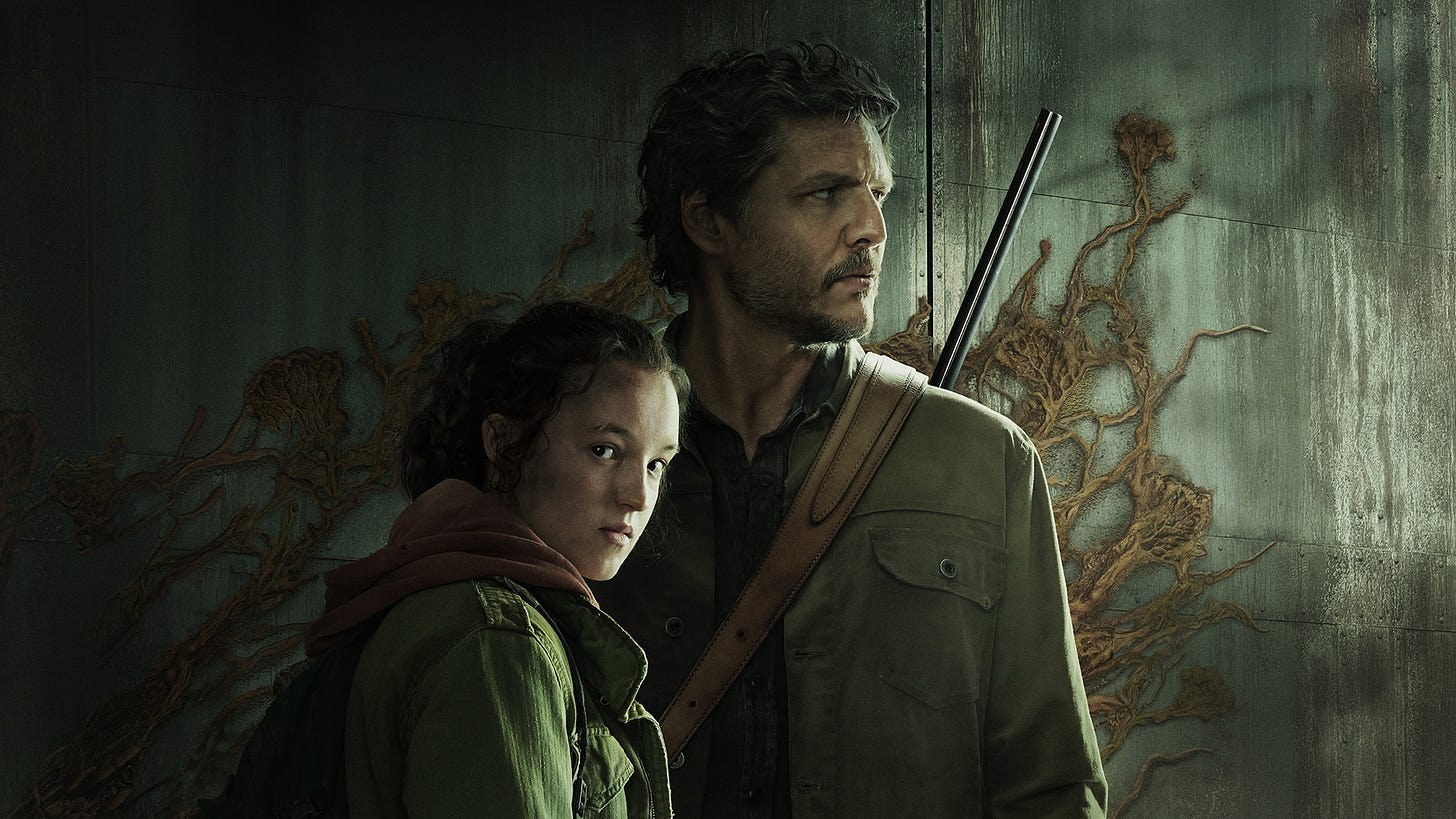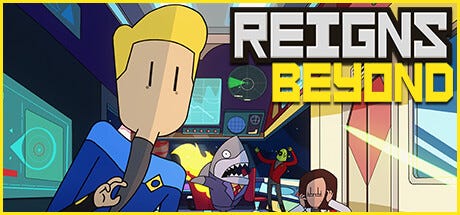Why are film & TV adaptations of games good now? Video Games Industry Memo, 18/04/2024
The Fallout fallout explained
This week’s Video Games Industry Memo is sponsored by Just About
Rewarding passionate communities & members for brilliant, grassroots content creation
The Fallout TV show maintains the run of good video game adaptations
Venture capital cash is returning to the biz, according to industry boffins
Reigns: Beyond blasts off another week of releases
Hola VGIM-ers,
This week’s newsletter comes to you from sunny Barcelona, where I’ve been speaking to members of the European Commission’s Radicalisation Awareness Network (RAN) Policy Support Function about the best way to build Public-Private partnerships with the games industry to prevent and counter violent extremism. A fascinating day out, I think you’ll agree.
Anyway, I wanted to say a big thank you to everyone who turned out for London Developer Conference last week. The speakers were immense, the audience was wonderful and the buffet lunch surpassed expectations, so well done all round.
I know that we’re already plotting a return next year. So if you’d like to get involved in supporting LDC 2025, send me an email to videogamesindustrymemo@substack.com so we can talk shop.
Speaking of me nattering, I also popped up in The Independent discussing GTA 6 and on Sky News to go on about layoffs. Watch the first piece here and read the second piece here, if it tickles your fancy.
But for now, let’s move away from shameless self promotion to shameless self justification instead as I make this week’s big read the perfect excuse for binge watching telly over the weekend. Enjoy!
The big read - Why are film and TV adaptations of games good now?
You can breathe a sigh of relief. The Amazon commissioned Fallout TV series landed on Prime last week and I can announce, after a quite disgusting couple of days sitting on my sofa, that it is an authentically excellent adaptation of the beloved role playing game.
The show, which weaves together the stories of three people adventuring through a post apocalyptic landscape after the bombs have gone off, strikes the perfect balance of being faithful to the source material while remaining a strong slice of TV that’s well worth tuning in for.
But outside of its standalone strength, Fallout represents something else too. It’s another example of a video game successfully crossing the borders between screens, joining the likes of The Last of Us and Sonic the Hedgehog in the adaptation winner’s circle.
But what’s driving this trend? The answer is that games have firmly entered the cultural mainstream and that they’re reaping the rewards of having people across wider society - including in the wider screen sector - finally take them seriously.
Video lames
Before we explore the delightful present of video game adaptations, we must accept that most film and television spin-offs over the past few decades have been historic horrors.
Stephen Garrett’s review of 2007 film Hitman for Time Out warned potential viewers that it was “encumbered by clunky dialogue, some amateurish performances and clichéd set-pieces.” The New York Times review of the 1994 Street Fighter movie read surprisingly similarly, criticising it as "a dreary, overstuffed hodgepodge of poorly edited martial arts sequences and often unintelligible dialogue." And Peter Bradshaw’s 2017 review of the Michael Fassbender fronted Assassin’s Creed movie called the movie “transcendentally boring” - suggesting that watching Fassbender paint a wall would have been a drastic improvement of what was on the big screen.
Yet amidst Bradshaw’s wide ranging, on the money and highly entertaining ire, the most important conclusion he draws about Assassin’s Creed is his final one; it reflected a cynical effort “to gouge money out of gamers’ rather than meaningfully reflect the medium they loved.
This, unfortunately, is a microcosm of what film and TV adaptations of games tended to be. Despite paying lip service to the medium, producers and performers showed disinterest in both the games they were portraying and the communities behind them.
On the production side, the Hitman movie offers one of the best examples of how badly adaptations missed the mark. It dropped the game’s ethos of rewarding players for taking out targets with precision and flair to offer up schlocky by numbers action picture fare - alienating fans in the process.
And in regards to performances, Rosamund Pike unfortunately effectively represented performers disdain for games adaptations when she admitted that she didn’t even research the Doom series before appearing in a film based on it.
However, Pike’s comments - which were made in November 2021 long after Doom released - also provide a clue to why the tide has turned for games adaptations.
Reflecting on her preparations nearly two decades after the film released, she admitted was embarrassed by her “ignorance and innocence” about what the game could mean to people who played it - something that has changed her approach to working on other IP adaptations since.
And while Pike doesn’t appear to have worked on another games adaptation since her Doom days, her realisation is indicative of a wider cultural shift towards respecting video games that has opened the door for our current golden age of adaptations.
A message from our sponsor: We have partnered with London Games Festival pillar WASD to launch Just About WASD: the home of content creation and rewards for WASD attendees and fans. Just About will be supporting the indie game showcase with on the ground challenges, shining a spotlight on the most exciting, creative and innovative new titles and studios in the industry. www.justabout.com/wasd
For the love of the game(s)
But how exactly is greater cultural recognition of games practically translating into better outcomes on film and television? I’d argue you can see its impact in three main ways.
First, there is literally more investment in terms of pure cash into video game adaptations that means there is more staked on getting them right.
To pick on it again because I am a terrible bully, the production budget for the 2007 Hitman movie was $24m. In comparison, Transformers and Spider-Man 3, the major IP driven action movies released that year, sported budgets of $150m and over $250m respectively: showing an enormous difference in ambition between adapting game IP and other entertainment properties at the time.
Fast forward 15 years though and the budgets assigned to major film and TV adaptations have been transformed. The cost per episode of The Last of Us was reportedly $10m, making it one of the highest budget TV shows of all time. And while the $100m budget for the 2023 Super Mario Bros animated movie is considered economical compared to a Pixar production, it likely exceeded the budget for prominent animated movies like Minions: The Rise of Gru - showing that companies making games adaptations are putting money where their mouths are.
Of course it’s important to say that putting a lot of cash in doesn’t necessarily result in quality coming out, as shown by memorable cinematic flops such as Kevin Costner’s Waterworld.
However, the increasing budgets of film and TV adaptations shows an appetite for deeper investment into video game tie-ins. And this glut in financing ties in well with the second factor driving the wave of excellent spin-offs: senior leaders in film and TV are personally invested in the cultural side of video games that is allowing them to maximise their financial opportunities.
Craig Mazin, the showrunner for The Last of Us, offers the best example of this. In March 2023, a journalist for The New York Times told the story behind Mazin’s rise to TV prominence in the wake of the show’s gangbuster success.
The piece outlined how Mazin, fresh off the success of the astonishing mini-series Chernobyl, was handed a blank cheque for his next project by HBO - the American streaming giant who backed the project - to make what he fancied.
His decision to ask to adapt The Last of Us wasn’t a decision motivated by dollar signs; it was the result of his authentic love for video games as a medium and for the strength of story told within the game specifically.
And while Mazin’s story may be the best example of this in action, his approach to games is, crucially, reflected in comments by Jonathan Nolan about his love of Fallout 3 and the pressure that the team responsible for delivering The Super Mario Bros film felt working on a franchise that they had fallen in love with in the 1980s.
The personal and financial investment into games adaptations leads us in turn to the third, and arguably most important, factor behind the recent waves of successes: smarter creative decisions as a result of greater interest in games.
Rather than disregarding the game IP, production teams have become much better at leaning into its strengths. This has allowed them to both draw upon a well of great material and exercise better judgement about when to change the formula - resulting in appropriate storytelling for the medium.
The success of The Last of Us’s adaptation is based in large part on a ‘no notes’ approach to the game’s overall narrative and its key story beats. But with the game itself stretching not much longer than the run time of a prestige HBO TV series, Mazin and co carefully added colour to the story - such as through the heartbreaking standalone episode about Bill - to enhance its appeal.
Fallout, on the other hand, goes the other way. It recognised immediately that it couldn’t give viewers the extraordinary agency that players of a mostly open ended role-playing series can get.
So instead, and much to its credit, the producers leant into the feeling of playing Fallout instead. It created a cast of lead characters who represented the divergent experiences of characters and players in the wasteland and then immersed them into Fallout’s kitschy, 1950s inflected vision of the end of the world - delivering funny and often downright horrifying television in the process.
The result in both cases has been creative output that has been widely watched, critically acclaimed and has sparked fresh interest in the series. The question therefore is what happens next off the back of it.
Culture shocked
It’s probably not at all surprising to hear that the answer to “what comes next for video game adaptations” is that there’ll be bloody loads of them soon.
Netflix’s catalogue of game adaptations is set to expand soon, after animated series based on Cyberpunk and League of Legends did numbers by being *checks notes* quite good.
More broadly, commercially and critically successful adaptations are getting sequels to reward their success with a third Sonic the Hedgehog movie, another Super Mario Bros and a second series of The Last of Us on the way.
It may even mean that we see some properly alternative games adaptations make it to the screen, with A24’s possible Death Stranding film and works based on acclaimed independently developed games like Dredge and Firewatch potentially taking us into wild (and occasionally wacky) creative spaces.
Of course, we need to set our expectations carefully. Recent successful adaptations have been the result, generally, of passionate people identifying games they’d love to work with and transforming the spirit of the experience into a new medium effectively through careful creative decision making.
The glut of interest in video games adaptations means, inevitably, that we will likely see crap adaptations re-emerge as the commercial ambulance chasing kicks into gear. There will also likely be occasional well intentioned misses (Paramount’s Halo TV series is respectfully done but, unfortunately, middling) that’ll likely set the conversation back.
But the point here is less about the quality of each individual adaptation and much more about the extent to which games have gone from an ugly televisual duckling into a beautiful screen based Swan by conquering the cultural mainstream.
Shows such as Fallout and The Last of Us demonstrate that now, more than ever, people who are well outside of the traditional games industry boundaries aren’t just comfortable about the idea of games; they’re ready and willing to contribute to the artistic debate around them in enthusiastic, highly creative fashion.
And with games making this kind of headway in film and TV, it is - almost certainly - well poised to make similar breakthroughs across wider society too.
News in brief
We got a great big Konvoy, rockin’ through the night: Gaming VC funding is up 94% quarter on quarter, according to Konvoy Ventures Q1 2024 Gaming Industry Report. While late stage funding is still absent, Growth and Early stage funding has bounced back after sagging to $319m in Q4 2023.
Cool News, Britannia: The UK games industry valuation has rolled in for 2023 and shows the market up by 4.4% to a record high of £7.82bn. Digital software and hardware sales grew by 4.1% and 2.3% to £5.1bn and £2.2bn respectively, with spending on games culture topping out at £313m partly as a result of all those great film and telly adaptations I was talking about earlier. Handy call back, eh?
Upsetting the Apple Shopping Cart: Apple has denied a claim by Epic Games that it is violating a U.S. Court Order to give developers more freedom to point users at alternative payment methods, suggesting that its 27% fee for managing payments prevents its technologies from being used by developers for free. It continues the ongoing antitrust battle between the two companies that is best summarised with this clip.
Tipping points: Mike Ybarra, a former President of Blizzard, has suggested that players should be able to tip game developers $10-$20 when they complete $70 games to say thank you to creators. Or we could just have an adult conversation about why we need to increase prices and not assume that angry 14 year olds on Reddit who don’t understand inflation represent the view of the market...
Engines of War: If you do have a spare half hour then this New Yorker long read on video game engines is well worth diving into. As well as providing a solid look at the evolution of Unreal, it also explores in depth the myriad ways it is being used in the wider world to reshape reality (including by the military).
A message from our sponsor: With the attention economy more challenging than ever, Just About’s dedication to authentic, positive and deeper community engagement gives fans and players even more ways to get involved. The bounty reward system values creators-in-the-making and sets them on the road to becoming your brand advocates and ambassadors. To find out more or meet us at WASD, reach out to Nicole Smith - nicole.smith@justabout.com
On the move
Friend of VGIM James Whatley has become the new Senior Strategy Director, Gaming at LEGO…Trailmix has hired five new starters including Matt Hood, Nathalie Wood, Sergio De Vita, Ankit Narang and Thomas Astor-Wood… Logie MacDonald has joined Ukie as its Communications Manager…And George Goodall is the new Business Development Manager at Keywords Studios…
Jobs, jobs, jobs
King is hiring for a Gameplay Designer for NEW GAMES ONLY, OK?...Wooga is searching for a Game Writer if you fancy the Berlin life…Be the Lead Analyst for Old School Runescape at Jagex, I dare you…Take-Two Interactive has another role going in London, this time as Director, Workplace…And there’s a Sales Manager/Director role going at RS UK too, if that tickles your fancy…
Events and conferences
Reboot Develop Blue, Dubrovnik - 22nd-24th April
OKRE Summit, London - 24th April (25% off with VGImemo25)
Dubai Game Expo, Dubai - 1st May
Digital Dragons, Krakow - 19th-21st May
Nordic Game, Malmo - 21st-24th May
Games of the week
Reigns: Beyond - Tinder but with consequences (so Tinder then) gets a space twist following previously successful royal and Game of Thrones themed editions.
Planet of Lana - Side scrolling puzzle game promises “an epic sci-fi saga that stretches across centuries and galaxies.”
Dave the Diver - Excellent diving game that becomes a full blown career simulator a few hours in releases on PlayStation 5 (finally).
Before you go…
The BAFTA Games Awards rolled through last week and, as expected, Baldur’s Gate 3 walked away with the Best Game Award and a veritable haul of gold faces.
But it was Larian’s composer Borislav Slavov who stole all of our hearts after he shed tears of joy backstage after being garlanded for the game’s outstanding soundtrack.









Good writeup, and I agree that many game adaptations failed because they were cash-grabs. But I think there is another issue - trying to pander to gaming audiences. Some of the best works in film and movies resulted from people who didn't try to toe the line. Famously, Ridley Scott didn't care at all about sci-fi movies when he made Alien, and Alfred Hitchcock had no interest in researching horrors when he made Psycho.
There are many more such examples - trying to please core fans often results in failure. But when someone makes an adaptation where they follow their own vision and lift what works best from the source material, it tends to come together much better. Point in case is the oft-overlooked yet arguably first great game adaptations, Silent Hill.
I think the same can apply to early comic book adaptations such as Iron Man, Raimi's Spiderman (which controversially did away with the web-spitting gadgets) and the Burton/Nolan Batman films. They use the source material, but they are not held hostage by it. Subsequent comic books films started to collapse under the weight of trying to constantly meet fan expectations rather than follow creative visions.
So, while I agree that a cash-grab mentality is often to blame, so is the attempt to appeal to the core audiences above following a vision enriched by the source material. After all, there is plenty of rubbish content that pleases fans but is not actually good (I'm looking at you, Warhammer).